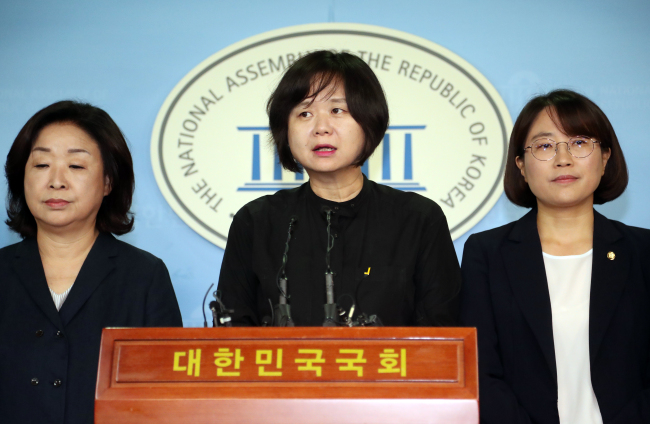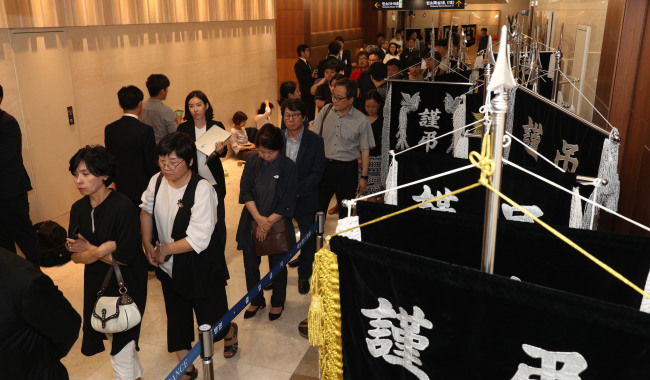Tens of thousands of people from all walks of life mourned the death of iconic liberal politician Roh Hoe-chan of the Justice Party, who took his own life last week amid allegations of receiving illegal political funds.
Over 72,300 visitors lined up day and night to pay tribute at the 40 memorial altars set up across the nation, and politicians across the aisle expressed their condolences for the late politician.
On Monday, Justice Party Chairwoman Lee Jeong-mi expressed gratitude for people’s support and vowed to realize the values that Roh had promoted.
 |
(Yonhap) |
“While it is impossible to replace Roh Hoe-chan, we will put all our efforts to fill in his place -- to realize the values and goals he promoted,” Lee said in a press meeting held after the five-day mourning period.
The party will also create a task force to watch over the prosecutorial probe which raised the allegations against Roh, even before confirming facts with the related figures, Lee added.
Roh had been suspected of receiving 50 million won ($44,300) in 2016 from a lawyer who is currently being investigated by an independent counsel team as one of the key figures behind an online political opinion-rigging scandal. In a note he left behind, Roh admitted to having received the money, but added it was not related to illicit solicitation.
While Roh admitted to taking illegal money, people continue to respect the former labor activist because he was a steadfast politician who manifested politics of “global standards,” said Shin Yul, a political science professor at Myongji University.
“He was a shy but warmhearted politician, who promoted consistent ideology in policies,” Shin said. “By global standards, I mean he was a brave liberal to address the human rights issues in North Korea -- in Korea, liberal politicians often avoid criticizing the communist state in any way,” Shin said.
“He knew how to draw the line between different agendas even under ideological influences,” he said.
Sohn Ho-chul, a politics professor at Sogang University, explained that the long lines of people paying respects at the funeral were emblematic of the public desire for politics in which the disadvantaged are also well represented.
“In another sense, it may reflect the great distrust people have of politics, by exceptionalizing Roh’s violation of the political fund law, because at least he has earned respect through his past work.”
The Justice Party has seen a surge in the number of people joining it following Roh’s death. Lee Chan-jin, the software engineer who created Hangul and Computer -- a Korean office software package -- and Jung Tae-in, the chief of Karl Polanyi Institute Asia publicly announced that they have joined the party.
An official from the Justice Party also confirmed that the number of new members increased, but said it could not provide the exact number as it is still in the mourning period.
The approval rating of the small party that holds five parliamentary seats at the 300-member National Assembly has also recorded its peak. According to a poll of 2,504 respondents by Realmeter on Monday, the rating for the Justice Party stood at 12.5 percent, ranking third on the list of the top five parties.
The ruling Democratic Party of Korea posted 44 percent, while the main opposition Liberty Korea Party followed at 18.6 percent. Minor opposition parties, the Bareunmirae Party and the Party for Democracy and Peace, garnered 7 percent and 2.9 percent, respectively.
 |
(Yonhap) |
The death of Roh sparked discussions on the amendment of the political fund law as well. On Wednesday, Rep. Kim Kwan-young, the floor leader of the minor center-right opposition Bareunmirae Party, addressed the need to revise the law.
“Rookie politicians cannot collect political funds unless there is an election in the year, exposing many of them to the lure of receiving money secretly,” Kim said in a party meeting. “Our party will push for the amendment of the law to reflect the reality of the political circle.”
The political fund law, which was established in 2004, limits incumbent politicians from collecting more than a certain amount of funding, and prohibits those who do not have a lawmaker position from receiving any funding, unless they become a candidate.
The increased attentions may be temporary, and it is crucial that the party come up with ways to overcome the loss of Roh, experts said.
“The party revolved around two big figures, Roh and Rep. Sim Sang-jeung (former party chairwoman). The party should come up with new personnel that can represent the party after the two,” said Sohn of Sogang University, highlighting how Korean politics is greatly influenced by personalities.
Political professor Shin echoed this view, adding that Roh made the extreme decision to commit suicide after being exposed as having received illegal political funds.
Amendment of the law, however, may be a far more complex problem that needs to consider various factor, according to Shin.
“In South Korea, the dichotomous thinking that politics are either absolutely good or bad is widespread. And people often think politics that involves a lot of money is not clean,” Shin said. “But politicking without any money is not possible in any country.”
“Such binary perceptions have set the standards for politics. Lobbying is also still prohibited here. To change this, we will have to look at the overall system, such as the election law and lobbying as well.”
By Jo He-rim (
herim@heraldcorp.com)






![[KH Explains] For Korean automakers, Chinese EVs may loom larger than Trump’s tariffs](http://res.heraldm.com/phpwas/restmb_idxmake.php?idx=644&simg=/content/image/2024/11/14/20241114050537_0.jpg)
![[Graphic News] Tainan predicted top destination for South Koreans in 2025](http://res.heraldm.com/phpwas/restmb_idxmake.php?idx=644&simg=/content/image/2024/11/13/20241113050807_0.gif)

![[Herald Review] Cho Seung-woo takes 'Hamlet' crown](http://res.heraldm.com/phpwas/restmb_idxmake.php?idx=644&simg=/content/image/2024/11/14/20241114050593_0.jpg)